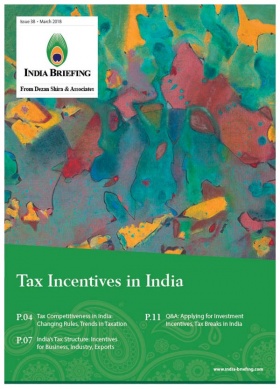Direct Taxes in India Explained
In India, there are two types of taxes levied by the government: Direct taxes and indirect taxes. Indirect taxes are levies imposed on goods and services, whereas direct taxes are levied on the income and profits of individuals and organizations. Direct taxes are directly paid to the government by the tax payer.
Income tax is a direct tax, paid on personal income by an individual or a company, to the federal government.
Who are tax payers in India?
Every individual, company, or business operating within India is liable to pay income tax.
The scope of income tax is determined by the tax slab and rates provided annually by the Union Budget. Income tax slabs and rates for the financial year (FY) 2017-18 are available here.
According to the Income-tax Act of 1961, there are seven categories of persons liable to pay income tax:
- An individual;
- A Hindu undivided family (HUF);
- A company;
- A firm;
- An association of persons (AOP) or body of individuals (BOI);
- A local authority, and;
- Every artificial Juridical Person not falling within any of the preceding categories.
Income heads for calculating income tax
Income tax in India is levied depending on the person’s source of income and his/her residential status. All sources of income are classified under the following five heads:
Salaries
The term ‘salary’ is defined to include the following:
- Wages;
- Any annuity or pension;
- Any gratuity;
- Any fees, commissions, perquisites, or profits in lieu of or in addition to any salary or wages;
- Any advance of salary;
- Any encashment of leave salary, and;
- Any amount of credit in a recognized provident fund of an employee to the extent that it is taxable.
For income to be treated as salary, the following conditions should be noted:
- There must be an employer-employee relationship between the payer and receiver of income;
- Salary income must be real and there must an intention to pay and receive salary, and;
- Salary may be received from more than one employer; it may be received from the present employer as well as from a prospective employer, and in some cases even from a former employer, such as pensions.
Capital gains
Capital gains taxation applies to earnings from the sale of capital assets held by the tax assessee. Capital assets refer to the properties such as buildings, lands, bonds, equities, debentures, and jewelries etc. Taxes are levied on the income of the assesse when such properties are sold.
Income from house property
Income tax is levied on house property if the house is given out on rent by the owner. However, under this income head, the property cannot be used for business or professional purposes, which will otherwise be subject to a different tax rate.
Profits and gains of business or profession
According to the Income-tax Act, the profits earned from businesses or by providing professional services are considered taxable as per applicable rates. This income head is also known as ‘profits and gains of business or profession’.
Income from other sources
Income from any sources – other than the four listed above – are categorized under this category. Some of these are listed below:
- Lottery/horse race winnings;
- Income from dividends;
- Pension received after the pensioner’s death;
- Rental income (other than house properties);
- Gifts received, and;
- Interest on government securities, debentures and bonds.
Income tax collection
There are primarily three ways in which income taxes are collected by the federal government.
Tax Deducted at Source (TDS)
TDS is a means of collecting income tax directly from the individual’s source of income on a periodical or occasional basis.
All entities in India (including foreign representative offices and Indian setups like wholly owned subsidiaries) are required to deduct tax (withhold tax) on employees’ salaries on behalf of the income tax department. An employer may also deduct TDS on various other payments including rent, interest, dividend, and royalty. The Finance Act of each financial year specifies the rates in force for deduction of tax at source as per the Indian Income-tax Act, 1961.
Selected TDS rates for resident Indians and NRIs are shown in the table below.
The recipient whose income tax has been deducted at source, is entitled to get credit of the deducted amount in his/her personal assessment. This credit is given on the basis of the TDS certificate issued by the deductor. The certificate is issued within 15 days from the due date for furnishing the statement of tax deducted at source.
Tax Collected at Source (TCS)
TCS is to be collected by the seller from the buyer at the time of sale of goods, which are classified into respective categories. The TCS rate is different for each of these categories, and the TCS collected by the seller must be deposited with the federal government.
Voluntary payment by tax payers into designated banks
Every taxpayer, who earns a taxable income, is required to pay income tax in India. A person who has an independent income can deposit self-assessment tax or advance tax to the credit of government by using a tax payment form or challan (ITNS 280). The form is available at the income tax department’s website and tax can be paid at designated banks through either physical mode, that is, in cash or check or via e-payment. After making the tax payment, the Challan Identification Number (CIN) is generated, which is to be cited on the income tax returns forms.
Editor’s Note: This article was first published on May 30, 2017, and is updated on February 19, 2019, as per the latest regulations.
About Us
India Briefing is produced by Dezan Shira & Associates. The firm assists foreign investors throughout Asia from offices across the world, including in Delhi and Mumbai. Readers may write india@dezshira.com for more support on doing business in India.
- Previous Article The Applicability and Calculation of Gratuity in India
- Next Article 印度2019年的临时预算是什么













